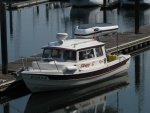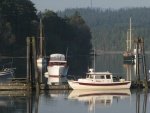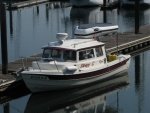My rig consists of a newer plotter/sounder, a slightly older, but still functional and reliable plotter GPS wired, and at least one (but usually two) of the workhorse Garmin GPS76Csx units that have been reliable for ten years. The garmin units have one with nav charts and one with topo maps, so if I go to shore I take the topo, on the water, tend to use the nav.
I have been inherently untrustful of my phone and its ability to be a good GPS, so I started using it exclusively, in waters I knew, and set my other units to a dark screen (combo MFD set to sonar only), periodically checking the phone and tablet against my marine electronics.
The phones and tablets have surprised me in their ability to work well with most of the software available. I tried several apps and found that they were, in some cases, more helpful thank my plotters. There is some stunning bottom detail available on some of the apps out there containing detail missed in marine charts.
For example, with the app "Marine Navigation" I found some very very detailed bottom maps (they offer multiple basemaps, the one I'm refering to is "Ocean Map") that I used to find little tiny holes and trenches to fish that aren't on any other maps I have. Most of these spots were productive, and all small contours and details were verified by the sounder. I was just blown away.
Some thoughts on their application:
Lifeproof cases (floating!) are a great idea.
You will probably have your screen brightness on high all the time, have a proper charger (as in the factory supplied charger) and an adequate power supply to it and keep your unit plugged in any timeit is possible to do so, even if the batteries are full. The GPS and the bright screen will eat up battery so quickly (on some devices the battery will drain with GPS on and a bright screen, even when plugged in) that you will find it draining even when plugged in. If you wait until the battery is low before you plug it in you may end up with a dead unit.
The devices I've used are iPhone 3Gs, 4G, 6s Plus, iPad 2, Air, Samsung Galaxy S5.
The Samsung is also sorta waterproof on its own, or it was.
The newer sounders/plotters are now communicating with devices directly as well. Thus, you may have that redundant functionality built in to your next sounder purchase. I am getting delivery on the smallest WIFI ready Lowrance (HDS7 Gen3) today. I can't wait to see what the ability to use the old ipad/phone in the nav system does. Might be nice!



